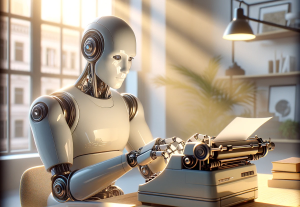Introduction
The advent of artificial intelligence (AI) has significantly impacted various industries, and Hollywood is no exception. One of the most intriguing applications of AI in the entertainment industry is in scriptwriting. This article delves into the role of AI in scriptwriting, exploring how automation is shaping Hollywood’s creative landscape.
The Evolution of Scriptwriting

-
Traditional Scriptwriting
Script writing has traditionally been a human-centric activity, relying on the creativity, experience, and intuition of writers. The process involves brainstorming, drafting, revising, and polishing scripts to create compelling narratives that captivate audiences.
-
The Advent of AI in Scriptwriting
The integration of AI into scriptwriting began with the development of algorithms capable of analyzing existing scripts and generating new content. These AI systems can process vast amounts of data, identifying patterns and trends that inform their writing.
How AI Scriptwriting Works

-
Data Collection and Analysis
AI scriptwriting systems start by collecting and analyzing a large corpus of scripts from various genres and periods. This data provides a foundation for the AI to understand narrative structures, character development, dialogue, and other essential elements of scriptwriting.
-
Natural Language Processing (NLP)
Natural Language Processing (NLP) is a critical component of AI scriptwriting. NLP enables AI systems to understand and generate human language, allowing them to create coherent and contextually appropriate dialogue and narrative elements.
-
Machine Learning and Pattern Recognition
Machine learning algorithms enable AI systems to identify patterns in the data they analyze. These patterns help the AI understand what makes a script successful, allowing it to generate content that aligns with established conventions and audience preferences.
-
Content Generation
Once the AI system has analyzed the data and identified relevant patterns, it can begin generating content. This process involves creating character profiles, plot outlines, dialogue, and other script elements. The AI can also revise and refine its output based on feedback and additional data.
Benefits of AI Scriptwriting in Hollywood

-
Efficiency and Speed
One of the most significant advantages of AI scriptwriting is its efficiency. AI systems can analyze vast amounts of data and generate content much faster than human writers. This speed can be particularly beneficial in the fast-paced environment of Hollywood, where tight deadlines are common.
-
Enhanced Creativity
AI can serve as a valuable tool for enhancing human creativity. By providing new ideas and perspectives, AI can help writers overcome creative blocks and explore new narrative possibilities. This collaboration between human writers and AI can lead to more innovative and diverse storytelling.
-
Cost-Effectiveness
The use of AI in scriptwriting can also be cost-effective. By automating certain aspects of the writing process, studios can reduce labor costs and allocate resources more efficiently. This cost-effectiveness can be particularly beneficial for smaller production companies with limited budgets.
-
Data-Driven Insights
AI systems can provide valuable insights into audience preferences and trends. By analyzing data from previous films and scripts, AI can help writers and studios create content that is more likely to resonate with audiences. This data-driven approach can increase the chances of a film’s success.
Challenges and Limitations

-
Quality and Originality
One of the primary concerns with AI scriptwriting is the quality and originality of the content it produces. While AI can generate coherent and contextually appropriate scripts, it may struggle to create truly original and innovative narratives. Human writers bring unique perspectives and experiences that AI cannot replicate.
-
Ethical Considerations
The use of AI in scriptwriting also raises ethical considerations. There are concerns about the potential for AI to replace human writers, leading to job losses in the industry. Additionally, the reliance on data-driven insights may result in formulaic and homogenized content, reducing the diversity and richness of storytelling.
-
Technical Limitations
Despite advances in AI technology, there are still technical limitations to consider. AI systems may struggle with understanding complex human emotions and cultural nuances, which are essential for creating compelling and authentic narratives. Additionally, AI-generated content may require significant human intervention and editing to meet industry standards.
Case Studies and Examples

-
AI-Generated Scripts
Several AI-generated scripts have gained attention in recent years. For example, the short film “Sunspring,” written entirely by an AI, showcased the potential of AI scriptwriting. While the script received mixed reviews, it demonstrated the capabilities and limitations of AI-generated content.
-
Collaboration Between AI and Human Writers
Some projects have explored the collaboration between AI and human writers. For instance, the TV show “Mr. Robot” used AI to generate dialogue suggestions, which the writers then refined and incorporated into the script. This collaborative approach highlights the potential for AI to enhance, rather than replace, human creativity.
The Future of AI Scriptwriting in Hollywood

-
Continued Advancements in AI Technology
As AI technology continues to advance, its capabilities in scriptwriting are likely to improve. Enhanced NLP, machine learning, and data analysis techniques will enable AI systems to create more sophisticated and original content. These advancements will further integrate AI into the scriptwriting process, making it an indispensable tool for writers and studios.
-
Ethical and Regulatory Considerations
The future of AI scriptwriting will also depend on addressing ethical and regulatory considerations. Ensuring that AI complements rather than replaces human writers will be essential for maintaining the industry’s creative diversity. Additionally, establishing guidelines and standards for AI-generated content will help maintain quality and originality.
-
Embracing AI as a Creative Partner
Ultimately, the future of AI scriptwriting in Hollywood will involve embracing AI as a creative partner. By leveraging the strengths of both AI and human writers, the industry can create more innovative, diverse, and engaging content. This collaborative approach will ensure that Hollywood continues to captivate audiences with compelling narratives.
Conclusion
The role of AI in scriptwriting is a fascinating and evolving aspect of Hollywood’s creative landscape. While there are challenges and limitations to consider, the potential benefits of AI scriptwriting are significant. By enhancing efficiency, creativity, and cost-effectiveness, AI has the potential to revolutionize the scriptwriting process. As the technology continues to advance, the collaboration between AI and human writers will shape the future of storytelling in Hollywood.










